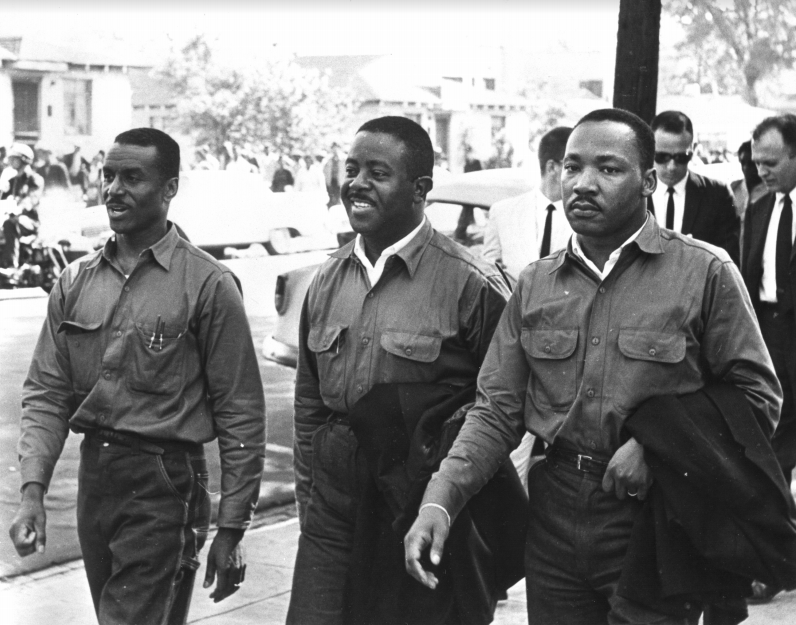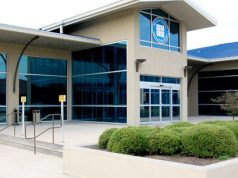
By Ariel Worthy
The Birmingham Times

During the Civil Rights Movement in Birmingham, children learned as many lessons outside the classroom as they did inside, remembered one of the child marchers.
“As kids we experienced racism on buses, in department stores. You couldn’t go anywhere in Birmingham and not see white and colored signs,” recalled, Jeff Drew, 66, who was raised in the North Smithfield community, named “Dynamite Hill” because it was the most bombed place in Birmingham.
“We didn’t have a concept of how deeply rooted racism and discrimination were in this community. We were kids,” he said. “As each day passed, we got closer to it and found out what was going on and how to fight it. Uncle Mike was there to teach us how to fight it and stay alive.”
“Uncle Mike” was the Rev. Dr. Martin Luther King Jr., whose national birthday celebration is Monday, January 15. He was a friend of the Drew family and would stay at their home during his visits to Birmingham.
Jeff Drew grew up in the movement. He is the son of John and Addine “Deenie” Drew. His father operated the Alexander Insurance Agency Inc., which he co-founded in Atlanta, Ga., in 1932; he opened a branch in Birmingham in 1950. And his mother was known by many as the “Den Mother” of the Civil Rights Movement.
Practicing Nonviolence
Jeff Drew participated in countless marches in Birmingham that played a pivotal role in ending segregation in the city. One requirement of King-led marches was nonviolence, he said. During some mass meetings at the St. Paul United Methodist Church in downtown Birmingham, children would collect weapons and put them in shoe boxes.
“Little kids like me would run up and down the aisles with shoe boxes collecting knives and guns in the church,” Drew said. “We’d collect them and put them underneath the altar, and the preacher would lock them up. After we got through marching and returned to the church, those who didn’t get arrested would pick up their knives and guns.”
This was to ensure everyone’s safety, he said: “Had we taken even a fingernail file to Kelly Ingram Park, [where the demonstrations were held, Public Safety Commissioner] Bull Connor would have the excuse he needed to kill all of us at once.
“All it would take was something shiny, something that would even look like a weapon, and that would have been all the provocation he needed. … That’s how important nonviolence was: having the temperament to have people spit on you [as you kneeled and prayed]. If you couldn’t do that, you couldn’t go with us, and [King] didn’t want you in there because everybody’s life was at stake.”
Drew also was put to work during the historic Selma to Montgomery march, which ultimately led to passage of the Voting Rights Act of 1965.
“My job in Selma was to keep black folks from stepping onto the curb,” he said. “After Bloody Sunday, [when state troopers on horseback and other assailants beat and injured more than 60 protestors who crossed the Edmund Pettus Bridge], we got a parade permit that would allow us to travel on the street but not the curb. … If a marcher stepped off the street and onto the curb, just like at Kelly Ingram Park [whites] would have felt they had the right to kill them for breaking the law.”
No Fear
Despite the opposition and threats from white officials, children who participated in the marches were not afraid of jail.
“If we were going to march, we had a toothbrush and a change of underwear in our pockets,” said Drew. “It was a time of great togetherness. The children and the young people were available, even if we had to jump the fence at school to go. Uncle Mike knew we needed high numbers to get the [U.S.] president to recognize us.”
Not everyone took part, though.
“There was so much fear in the black community that it was only natural for people to be hesitant to join the movement,” Drew said. “Teachers knew they were going to lose their jobs. Businessmen were afraid of retribution, meaning if they were going to be Civil Rights workers some people just weren’t going to do business with them.”
Still, enough joined to affect change.
“If one marcher got arrested, we had another come take his place,” Drew said. “We were proud of that. We were proud to participate in something we thought was perfectly just. The Civil Rights Movement was based on the philosophy of peaceful protest of an unjust law. As long as we could remain peaceful, we could protest, we could demonstrate, we could march, we could boycott, we could sit-in and draw attention to Jim Crow laws, racism . . . and all of Dixie’s segregation laws—as long as we were peaceful.”
King Saved Lives
Drew credited King with saving lives in several ways. For example, one night cars in front of the St. Paul United Methodist Church were set on fire.
“They tried to fool us into thinking the church was on fire, so we would run out,” Drew said. “Bull Connor didn’t like for us to have meetings. Anytime there were five or six black people in one space, he would get upset. And when [King] would speak at these mass meetings, there was standing room only.
“With all those cars parked up and down 15th and 16th streets at night, the cops knew what was going on. When the cops saw how [King] was organizing the demonstrations, they did what they could to interrupt it and tried to lure us outside.”
King and his associates discovered that the church wasn’t on fire.
“They saw that the smoke was coming from the empty lot across the street,” Drew said. “They had the fire department and the police department out there. [King] commanded us to remain in the church, which, in my opinion, saved our lives.”




